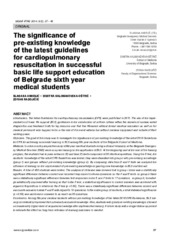Please use this identifier to cite or link to this item:
https://rfos.fon.bg.ac.rs/handle/123456789/1284| Title: | The significance of pre-existing knowledge of the latest guidelines for cardiopulmonary resuscitation in successful basic life support education of Belgrade sixth year medical students | Authors: | Anđelić, Slađana Kalimanovska-Ostrić, Dimitra Radojičić, Zoran |
Keywords: | students;latest CPR Guidelines;knowledge;education;BLS | Issue Date: | 2014 | Publisher: | Pharmamed Mado Ltd. | Abstract: | Introduction. The latest Guidelines for cardiopulmonary resuscitation (CPR) were published in 2010. The aim of the implementation of basic life support (BLS) guidelines is the introduction of uniform criteria within the domain of cardiac arrest diagnostics and treatment both for lay rescuers and first line lifesavers without formal medical education as well as for medical personnel who happen to be in the role of the event witness but without medical equipment and outside of their working place. Objective. The goal of this study was to investigate the significance of pre-existing knowledge of the latest 2010 Guidelines for CPR for achieving successful training in BLS among 6th year students of the Belgrade School of Medicine. Methods. In a five-month prospective study of 6th year medical students doing a clinical internship at the Belgrade Emergency Medical Services (EMS) were in a peer training on the application of BLS. At the beginning and at the end of the training program, the students had to pass entrance (E) and final (F) tests composed of 25 identical questions. Using the E test, the students' knowledge of the latest CPR Guidelines was tested; they were classified into groups with pre-existing knowledge (group I) and groups without pre-existing knowledge (group II). By comparing data from E and F tests we analyzed the influence of training on the improvement of pre-existing knowledge or gaining new knowledge in BLS and first aid. Results. A total of 423 students were tested. The analysis of obtained data showed that in group I there was a statistically significant difference between correct and incorrect responses to eleven questions on the F and E tests. In group II there was a statistically significant difference between test responses in the E and F tests to 17 questions. In group II, knowledge additionally improved after training so that in the F test, a statistical significance in correct answers was achieved with regard to 8 questions in relation to the E test (p LT 0.05). There was a statistically significant difference between correct and inaccurate answers in tests F and E with regard to 10 questions. In the entire group of students, a total statistical significance (p LT 0.05) was achieved in answers to as much as 25 questions. Conclusion. Among 6th year medical students without pre-existing knowledge of the latest 2010 CPR Guidelines, BLS training considerably improved their previously acquired knowledge. Also, students with good pre-existing knowledge, showed a considerably higher level of acquired knowledge after implemented training. A future study with a longer follow-up period to estimate the effect on long-term retention of learning outcomes is needed. | URI: | https://rfos.fon.bg.ac.rs/handle/123456789/1284 | ISSN: | 1334-5605 |
| Appears in Collections: | Radovi istraživača / Researchers’ publications |
Show full item record
SCOPUSTM
Citations
2
checked on Nov 17, 2025
Page view(s)
2
checked on Dec 28, 2025
Download(s)
2
checked on Dec 28, 2025
Google ScholarTM
Check
Altmetric
This item is licensed under a Creative Commons License


